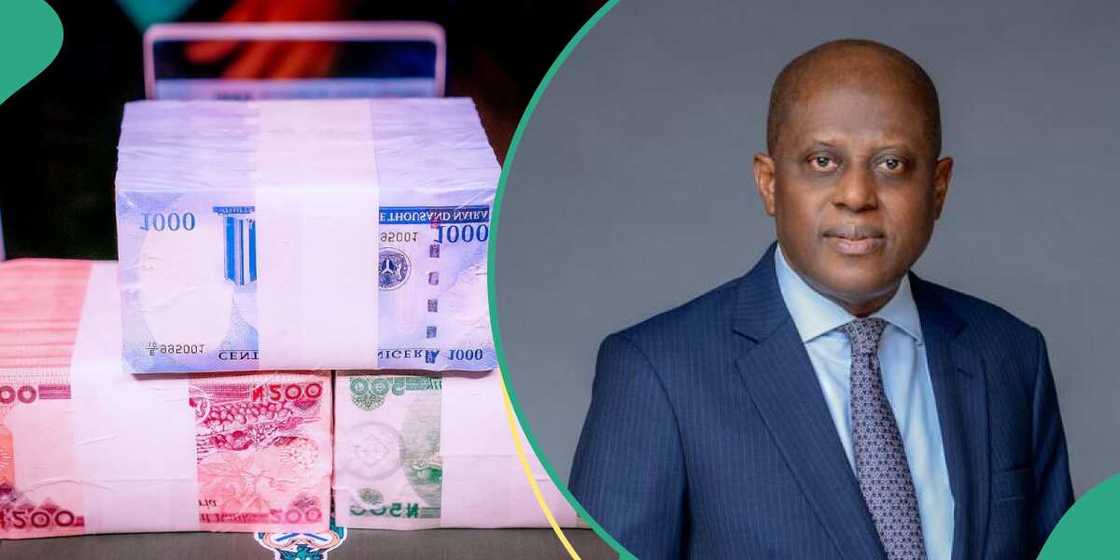Nigeria’s External Reserve Falls by $2.16 Billion as CBN Sells Dollar to Save Naira
- Data by CBN has shown that the external reserves declined by $2.16 billion in the last month
- This came as a Bloomberg report estimated that Nigeria may be using up its foreign exchange reserves to save naira
- FMDQ data showed that just $581 million has been sold by the central bank on the official market
PAY ATTENTION: The 2024 Business Leaders Awards Present Entrepreneurs that Change Nigeria for the Better. Check out their Stories!
Legit.ng journalist Zainab Iwayemi has over three years of experience covering the Economy, Technology, and Capital Market.
CBN data has disclosed that Nigeria's external reserves decreased by $2.16 billion during the previous month, reaching a seven-year low of $32.29 billion on April 15, 2024, from $34.45 billion on March 18, 2024.

Source: UGC
Recall that a recent Bloomberg report estimated that Nigeria may be using up its foreign exchange reserves at a rate that has not been seen in four years.
The development had raised questions about whether the central bank is reducing the amount of dollars it has to sustain the naira despite having previously promised to allow the currency to float more freely.
PAY ATTENTION: Сheck out news that is picked exactly for YOU ➡️ find the “Recommended for you” block on the home page and enjoy!
The value of the naira dropped to around N1,900 to the dollar at the start of the year. But recently, the naira has strengthened and is now worth roughly N1,100 to the dollar.
Based on the most recent data available from the CBN, Bloomberg calculated that liquid reserves had dropped 5.6% since March 18, when the naira began its recovery from record-low levels against the dollar to $31.7 billion as of April 12.
This is the largest decline in a comparable period since April 2020, according to data compiled by Bloomberg.
The central bank announced last month that it had paid out a backlog of past-due dollar purchase agreements, which amounted to an estimated $7 billion since the year's start.

Read also
Naira loses more value against US dollar, Nigerians blame 2 new platforms, ask FG to close them
Nigeria's foreign exchange reserves remain substantial due to increased oil prices and the inflow of funds from multilateral loans.
The IMF estimates that approximately $32.6 billion gross reserves are sufficient to cover imports for roughly six months.
Reserve decline did not affect FX sales
The Nigerian Autonomous Foreign Exchange Market (NAFEM) is tracked by the FMDQ Securities Exchange, and their data reveals that just $581 million has been sold by the central bank on the official market.
Thus, the CBN's sales during the same period only accounted for 3.2% of the $17.9 billion total market turnover.
Additionally, the data revealed that the CBN purchased dollars from banks twice throughout the time frame.
For a total of $80 million, there were two transactions: one for $50 million on March 28 and the other for $30 million on March 27.
The overall CBN interventions amount to $661 million when the $80 million that the apex bank has sold to Bureau de Change operators this year (after lifting a three-year restriction) is taken into account.
Nigeria's foreign reserves, on the other hand, decreased by $2.16 billion over the previous month.
However, that amount is more than twice as much as the CBN's total market interventions.
Daily Trust reported that the reserve decline did not affect foreign exchange sales, according to NAFEM data.
The CBN reports that $3.07 billion of the $6.11 billion in total outflows during this time were used to pay down external debt.
Why naira rose when reserve depleted
In related news, Legit.ng reported that Cardoso declared that the country's top bank is not defending the naira with its foreign reserves.
He made his remarks in view of the recent decline in Nigeria's foreign reserves and the significant rise in the naira's value on the foreign exchange (forex) market.
According to recent Bloomberg data, Nigeria is using up its foreign exchange reserves at a rate that hasn't been seen in the previous four years, as Legit.ng has reported.
PAY ATTENTION: Donate to Legit Charity on Patreon. Your support matters!
Source: Legit.ng




